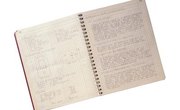Writing effective essays is one of the most important skills to develop for your college classes. Many classes require you to write essays throughout your academic career, some of which could have significant impact on your final overall grade. Summary and reflection essays are two common types of writing that professors ask of college students, and learning to effectively write in these styles will go a long way toward helping your grade.
Reflection Paper: Thinking and Reacting
The reflection essay is all about your response to the material. Consider how the content you've been assigned made you feel after you read it. Be sure to cite specific passages in your responses. State whether or not you agree with the author's point of view or particular interpretation of an event. Analyze any fictional characters, specifically commenting on their depth, authenticity and contribution to the overall narrative.
Reflection Paper: Organize but Don't Summarize
Your writing should be presented in a clear and easy-to-follow structure. Start at the beginning of the book or paper on which you are reflecting and work your way forward. Be careful, however, not to simply summarize the content. The instructor is looking for your input and personal reaction to the material. Simply regurgitating the facts is not sufficient.
Summary Paper: The First Reading
Read the material without taking any notes initially. Absorb the content. Incessantly taking notes and writing in the margins will likely distract you from soaking in the material. Before going deeper into the work, you initially want to have a general idea of the text and how it progresses. This is why the first reading is so important.
Summary Paper: The Thesis
Locate the thesis. This is the central idea or theme that the writer is trying to express. In academic work, the thesis is typically located in the opening paragraph of the essay. To adequately summarize the work, you will need to understand what thesis is being presented and what points the writer users to support it. These are the elements ideas you will want to include in your summary of the material.
Related Articles
References
Writer Bio
Based out of the bluegrass of Lexington, Kentucky, Joe Lewis began his freelance writing career in 2002 as a columnist for Decipher, Inc., and Worlds Apart. His opinions and analysis in the realms of technology, search engine optimization and social media have also been featured in both WebProNews and Attribute Magazine.











